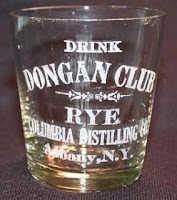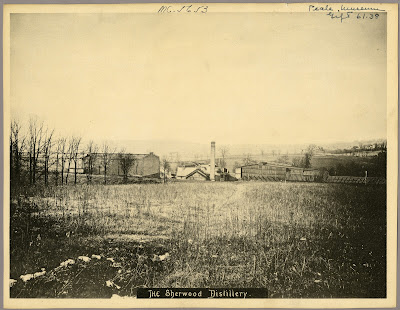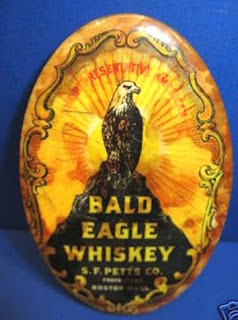 Perhaps no distiller either before or since has surpassed the career that Charles Tracey, shown here, crafted as president and treasurer of the Columbia Distillery Co., in Albany, New York. He was a four-term member of the U.S. House of Representatives, an aide to five governors of New York, including one future President, and a man who also went to war for the Pope.
Perhaps no distiller either before or since has surpassed the career that Charles Tracey, shown here, crafted as president and treasurer of the Columbia Distillery Co., in Albany, New York. He was a four-term member of the U.S. House of Representatives, an aide to five governors of New York, including one future President, and a man who also went to war for the Pope. Tracey exemplified the Irish-American Catholic who rose to power by mixing politics liberally with whiskey.
Charles was the son of John Tracey, an orphaned immigrant from Rosecrea, County Tipperary, Ireland. With older siblings John arrived in Montreal in 1825. Initially he settled there, married Maria McCarthy and set up in business. Forced to leave Canada because of suspicion he was involved in anti-British protests, he emigrated to the U.S. circa 1838 and settled in Albany. There he founded the Columbia Wine and Liquor Company. The Tracey family and its whiskey business thrived in America, achieving wealth and political influence.
Charles Tracey was born in Albany in 1847, attended school there, and early on showed an adventurous spirit. In 1866, barely 20, he visited the Middle East and Europe. While in Italy he enlisted and served two years as a corporal in the Pontifical Zouves, part of the Pope’s army. In 1870, returning to Europe, he went to Rome and took part in the battle for the city against the forces of King Emmanuel. Captured, he was held prisoner for a time.
Upon his release Tracey returned to the U.S. Subsequently Pope Pius IX made him a Knight of St. Gregory the Great with the rank of “Chevalier.” It was first of many titles Tracey would enjoy in his ascendancy.
Back home he joined his father in the liquor trade. With his parent’s death in 1875, Charles, age 28, took over the management of the business, then known as Columbia Distilling Company.
Always looking for new challenges, the same year Charles accepted an invitation from Governor Tilden of New York (later a Presidential candidate) to become his aide-de-camp with the rank of colonel. Two years later, at the age of 30, the next governor named him Commissary General. That post was responsible for the general custody and supervision of the military property of New York State. He held the job under succeeding New York governors, including Grover Cleveland, later President of the United States. Charles carried the title, “General,” for the rest of his life.
At age 36 Charles married Hermine Duchesnay in Montreal. They had five children of whom one, James, died in infancy. Surviving were Marie, Philip, John and Charles Jr.
In 1886 Charles incorporated the whiskey company becoming both president and treasurer. A letterhead indicates that the sales offices were on State St. in Albany,with the distillery, likely a rectifying plant and bonded warehouses, in Waterloo, New York, 180 miles away.
 Charles was just getting started on his political career. In 1887 he was elected from Albany to the U.S. House of Representatives. He would go on to serve four terms. The Albany Morning Express said of him as he ran the second time: "Gen. Tracey is young, energetic, intelligent, with plenty of leisure for his public duties, and the tastes which lead him to enjoy their punctilious discharge.”
He cut a figure in Congress, earning him a full length illustration as he strolled on Capitol Hill, shown here.
Charles was just getting started on his political career. In 1887 he was elected from Albany to the U.S. House of Representatives. He would go on to serve four terms. The Albany Morning Express said of him as he ran the second time: "Gen. Tracey is young, energetic, intelligent, with plenty of leisure for his public duties, and the tastes which lead him to enjoy their punctilious discharge.”
He cut a figure in Congress, earning him a full length illustration as he strolled on Capitol Hill, shown here. His importance was emphasized in a 1891 book on New York political figures in which it was said of him: “Gen. Tracey is quiet and unassuming in his manners, sunny in his disposition, firm in his opinion of what he believes to be right, and honorable in his discharge of public and private duties. He is therefore well qualified to be a leader and adviser among men having charge of political affairs.”
While he served in Congress, Charles continued to look after the whiskey business. Strongly opposed to the Illinois-based “Whiskey Trust,” in 1900 he sold Columbia Distillery to a “backlash combine” of six distilleries called the New York and Kentucky Company. Headed by Water B. Duffy (see my post April 2022), the new organization was capitalized at $2 million. Charles was elected an officer and board member.

 During this period Columbia Distilling produced a number of give-away items to advertise their various brands, which included shot glasses and tip trays for "Beaver Rye"and "Dongan Club Rye." The last was named for an organization that honored a former colonial governor of New York, a Catholic, Thomas Dongan.
After four terms in Congress, during which he staunchly upheld the rights of the whiskey industry, Charles was defeated in1895. He went on to become the head of the “Gold” Democrats, a conservative faction of the party, organized against “free silver” advocates.
During this period Columbia Distilling produced a number of give-away items to advertise their various brands, which included shot glasses and tip trays for "Beaver Rye"and "Dongan Club Rye." The last was named for an organization that honored a former colonial governor of New York, a Catholic, Thomas Dongan.
After four terms in Congress, during which he staunchly upheld the rights of the whiskey industry, Charles was defeated in1895. He went on to become the head of the “Gold” Democrats, a conservative faction of the party, organized against “free silver” advocates. Charles died in 1905, age 58, and was buried in St. Agnes Cemetery, Albany. His tombstone lists his service in the Zouaves, his Knighthood of St. George and his Congressional service.
After Charles' death, Columbia Distilling, now owned by the New York and Kentucky Co., moved its headquarters to Broadway in Albany and installed a new manager, as illustrated by a 1906 ad.
Charles died in 1905, age 58, and was buried in St. Agnes Cemetery, Albany. His tombstone lists his service in the Zouaves, his Knighthood of St. George and his Congressional service.
After Charles' death, Columbia Distilling, now owned by the New York and Kentucky Co., moved its headquarters to Broadway in Albany and installed a new manager, as illustrated by a 1906 ad.  According to a Moody’s analysis, by 1918 the combine had increased its assets to $6 million while the much larger Whiskey Trust had imploded. Columbia Distilling was still part of the organization but identified as rectifiers (i.e., whiskey blenders) not distillers. Everything stopped in 1920 with National Prohibition.
According to a Moody’s analysis, by 1918 the combine had increased its assets to $6 million while the much larger Whiskey Trust had imploded. Columbia Distilling was still part of the organization but identified as rectifiers (i.e., whiskey blenders) not distillers. Everything stopped in 1920 with National Prohibition. As noted earlier, no pre-Prohibition whiskey man ever climbed the political ladder more effectively than did Charles Tracey, a fact seemingly recognized by his contemporaries. After his death a colleague penned these lines in verse:
His life was plotted on a noble plan,
He viewed the future with a trustful smile.
Gentle and true he leaves an honored name More lasting in the hearts of friends than fame.





























